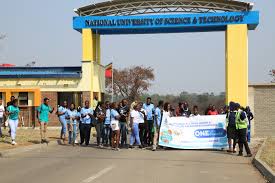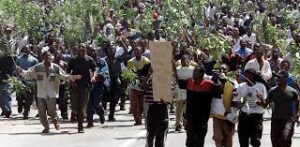Fortune Nkosi
Bulawayo–The National University of Science and Technology (NUST) in Bulawayo this week adopted a controversial policy that effectively barred many students from writing final semester examinations because of failure to pay fees.

In 2017, the Higher Education ministry ordered universities to allow defaulting students to sit for their examinations and permitted the tertiary institutions of learning only to withhold results till learners paid, when it was reported that Lupane State University (LSU) had kicked final examination takers out.
Yet, five years later in 2022, LSU once again denied students entry into examination rooms.
A lecturer at NUST who cannot be named to protect the teacher told NewsHub that, because of the policy, only about 22 percent of students in a final year class managed to write examinations that commenced yesterday.
“It is disheartening to teach students and they fail to sit for the examination,” said the lecturer. “It is worse if they are students who are preparing to graduate and go on to do other things in life. Only 20 students in a final year class of 90 managed to sit for my examination.”
This publication established that lecturers from the journalism department protested to the university’s senior directorate that they could not invigilate only a small fraction of the students but the bursar’s office dug in, saying they were “not running a charity”.
The Pro-Vice Chancellor for Research and Academic Affairs, Yogi Naik, reportedly pressed for the defaulting students to write the examinations, to no avail.
Yogi could not be reached for a comment at the time of publishing.
Some of the affected NUST students said they were only informed a week ago that only those that had paid at least 50 percent of the fees would be allowed to sit for the examinations.
They added that the university permitted them to pay in local currency or US dollars.
The students are now pinning their hopes on the Student Representative Council (SRC) to negotiate a deal with the university to allow them a two to three week extension to write the examinations as they look for the outstanding fees.
But the no-fees-no-examinations policy will also cost the university.
“This will be a… loss on the institution’s side in that they now have to plan for supplementary examinations,” one student told NewsHub.
“It (barring students) will be time consuming as the university still has to print out more papers. We hope the SRC can negotiate with the university for an extension,” added the student.
“It will be a waste of time and resources for the university. The university has to plan again, according to the university’s calendar, to invigilate again for the students that haven’t written.
“The invigilators would want to be paid. It will also be a waste of material to print out new examination papers for students who haven’t paid. They can’t write a paper similar to the one that has already been written,” another student observed.
Students are relying on their SRC to negotiate with the university to stick to the old arrangement of allowing students to write examinations even if they have not paid their full fees.
“They can hold on to the results after that,” said another aggrieved student. “What we are pleading for is (for NUST) to at least allow the students to write. This gives students more time to acquire the…remaining balance needed in order for them to get their results.”
The NUST communications and marketing director, Thabani Mpofu, dismissed reports that students were barred from writing the examinations over unpaid fees as “a false rumour.”
“Only registered students wrote their exams. What I know is, for students to write exams, they have to be registered,” Mpofu said.
Bulawayo Polytechnic students recently won a case against their institution, which had insisted that fees must be paid only in US dollars.
The court ruled that students should be allowed to pay in the RTGS currency or in US dollars.
Midlands State University (MSU) was back in 2017 forced to enlist the help of the police anti-riot unit when students who had been barred from their end-of-semester examinations violently protested and besieged the Vice Chancellor’s office.



Comments are closed.